She’s a Horror: Ms. 45 (Abel Ferrara, 1981) / Carrie (Brian De Palma, 1976)
The Sins of Women.
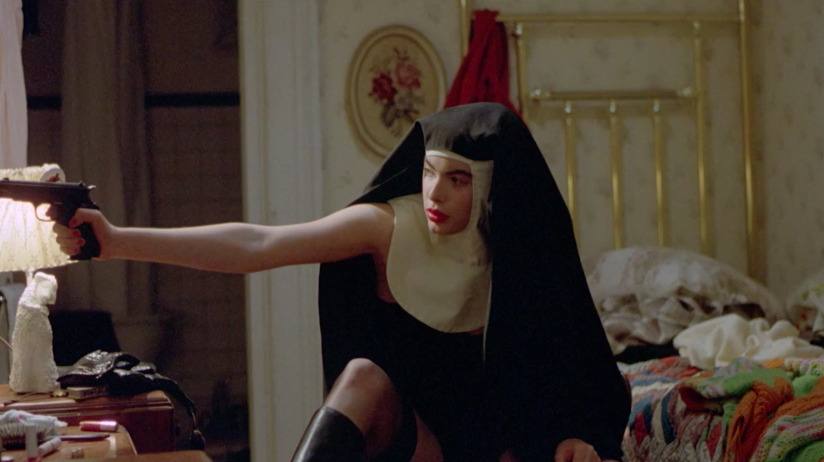
Welcome back to the Halloween special! Subscriptions are 30% off with the code HALLOWEEN21; all new income generated this month will go to the National Network of Abortion Funds. This year's theme is THEY WANT REVENGE, horror movies about sexual violence and vengeance; again, my goal is to be survivor-focused, but the movies can be heavy, so listen to yourself about what you need.
If you want to support me directly, the second issue of MAW hits comic shops and digital retailers October 20. You can read the first five pages of the new issue here.
There’s a movie scene you almost certainly remember, even if you haven’t seen the movie in question; a big, glittering party disintegrating into slow-motion and colored lights and blood and screaming, as a much-victimized woman finally unleashes the full extent of her rage. That scene is the ending of both Carrie and Ms. 45. The woman in the first movie is angry at high school bullies; the second woman is angry at rapists. What they have in common, aside from their tendency to resolve problems with mass murder, is that neither of them will be alive by the end of the film.
The heroines of rape-revenge movies nearly always die. Promising Young Woman ends with Carey Mulligan’s rainbow-painted fingers decaying in a shallow grave. Audition ends when Asami breaks her neck. Even the more metaphorical or teen-friendly versions end with the revenge-taker being punished, often at the hands of another woman: The “bad,” rapist-killing witch in The Craft goes mad and is locked up, effectively ending her life in the outside world. Ginger Snaps kills off Ginger and Jennifer’s Body kills Jennifer.
Do these stories necessarily betray their heroines? The death at the end of Promising Young Woman inspired reams of published anger – not only because the movie's ultimate "justice" comes from the cops (which I agree was a stupid choice, and not the one Emerald Fennell originally wanted to make) but because the vengeance was undermined by making us watch a not-very-violent character die a painfully prolonged death at the hands of an actually-very-violent man. I didn't mind the PYW ending, mostly because it felt customary for the genre, but then again, I've been angry about the end of The Craft for thirty years.
The bargain that sexual assault survivors make with these movies – two hours of revenge fantasy, followed by watching our avatars destroyed for wanting revenge – is a raw deal. Yet I also think rape-revenge movies kill their protagonists because they don't know what else to do with them. Intentionally or not, these movies create women who are simply too powerful to exist in this world.
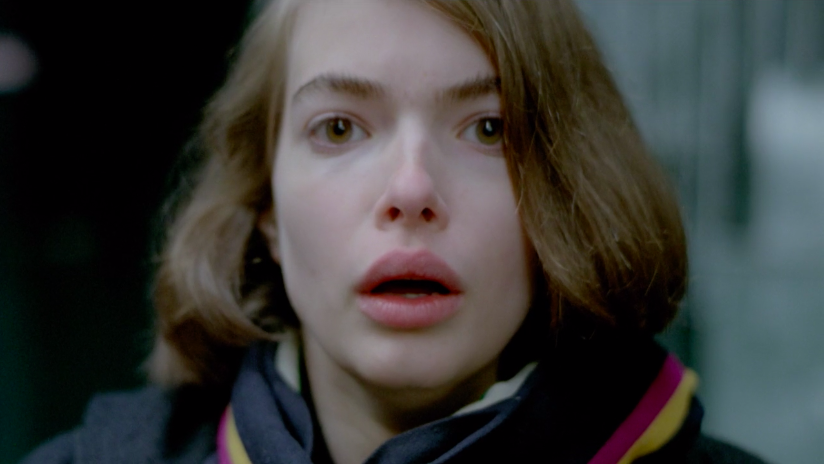
In Ms. 45, the rape happens twice. As I've written elsewhere, older rape-revenge films tend to treat rape as a singular act — one big, gory, grisly scene, which the rest of the movie is devoted to avenging. Ms. 45 situates its heroine, a non-verbal seamstress named Thana, in a context where rape feels common and inevitable. Just getting out of work, she passes through a whole gauntlet of aggressive cat-callers. A stereotypical masked criminal pulls her into an alleyway to rape her. When she gets home, a different burglar is there, and — upon realizing that she’s unable to speak, and thus can't report him — he rapes her, too.
“Why am I watching this?” you ask me, and I will tell you why: During the second rape, Thana reaches her limit, and she kills the guy with a clothes iron. She then hides him in her bathtub, chops him up into little bitty pieces she keeps in her refrigerator, and attempts to move on with her life.
The trouble — as the movie’s remarkably accurate depiction of Thana’s panic attacks and flashbacks conveys — is that, having been attacked more than once, Thana is always aware that she lives in a world with more than one rapist. How can she be safe when she’s only killed one of the men who hurt her? How can she be safe when there are always more men like him in the world?
Thus, a movie that initially feels like cheap trauma porn settles into something like an exploration of systemic misogyny. Thana’s hypervigilance means that she’s attuned to every threat: The “nice” boss who won’t stop touching her, the overly-aggressive cat-caller who follows her down the street, the creep who tells her that he can make her a model if she’ll just come back to his apartment. Thana also owns a gun, and she knows she can kill a man without feeling too bad about it. Hijinks ensue.
The movie centers on Thana’s transformation from panicked trauma survivor to hardened killer. Zoe Lund’s performance is rightly legendary; thanks to her, we see Thana become an entirely different person over the course of an hour and twenty minutes. In her early scenes, she strikes us as a little girl, tiny and timid, with huge, terrified eyes, like a puppy about to get hit by a truck. As she steps into her power, she also steps into adulthood. Her final form — black leather pants and thigh-high boots and slicked-back hair and perfect, icy stillness — is worlds removed from the person she was before the trauma. She’s unrecognizable to herself, and to us as well.
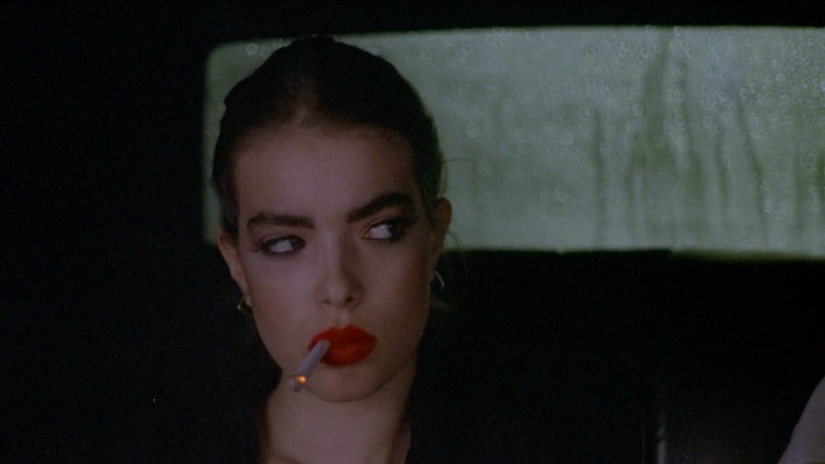
It’s too easy to call Ms. 45 a feminist triumph. For one thing, it’s racist. As Thana gets more powerful, and more capable of killing in cold blood, her victims are increasingly stereotypes of Black and brown men. (A pimp; a gang that threatens her, very realistically, with nunchucks; a Saudi Arabian man who tries to buy her.) The white guys get establishing scenes wherein we learn what specific variety of horrible they are, but when it comes to these men, it’s presumed that we’ll cheer their deaths without needing to have their misogyny proven at length. You can say it's a product of its time, but people in our time think this way, too.
Yet, in the scenes with the shitty white guys, Thana has a point. Her whole life is structured like that gauntlet of cat-calling men from the first scene — it’s not one violent man that’s the problem, it’s that she never stops running into violent men, and they all reinforce each other, turning the world into a terrifying place. We understand that fear. We understand why, after she dispatches the nice-guy boss, Thana would return to the party and start firing indiscriminately into the crowd.
It’s not that she’s ridding the world of rapists. Maybe, in the moment, that’s what she believes; her final spree occurs at a party where everyone is wearing masks, as her first rapist did, which makes her seem not so much evil as deeply traumatized. Still, no-one goes on a shooting spree expecting to improve their lives. Thana is inviting the inevitable, going out in a blaze of glory, even if “glory,” for her, has a distinctly Valerie Solanas tinge. She can never rid the world of every rapist, but she can go down fighting. At least, she can until she’s betrayed.
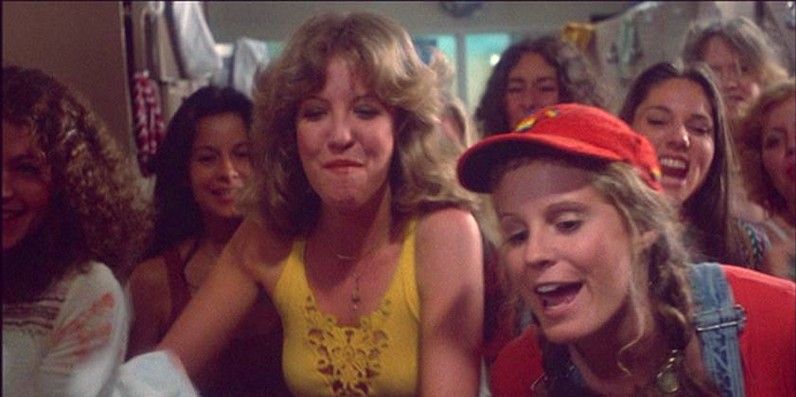
So we turn to Carrie; another cornerstone in the revenge canon, and a movie you are far more likely to have seen. Carrie is Steven King joint, and as such, it’s part of the core syllabus of American pop culture. You know about the period in the shower and the girls throwing tampons. You know about bullies, and telekinesis, and Sissy Spacek’s bug-eyed rage face; when someone says “pig’s blood,” you imagine a bucket of it being dumped on somebody at the prom.
It’s very hard to give a fresh reading of Carrie, given all that accumulated familiarity, not to mention all of the other readings — a blood-spattered Sissy Spacek is on the cover of The Dread of Difference, the 101 primer for feminist horror studies, and the poor girl gets referenced by more or less every essay therein. So I won’t reinvent the wheel. I won’t try to tell you anything you don’t know about Carrie. What I will point out is that Carrie is very nearly the same movie as Ms. 45, except that most of its villains are women.
Carrie, like Thana, spends her whole movie getting to a party where she will end the world as she knows it. For Thana, it’s her boss’s Halloween party. For Carrie, it’s the prom, where (unbeknownst to her) she’s been set up for a cruel practical joke by the mean girls at her school. That joke is of the 10 Things I Hate About You variety — hot guy asks out the unpopular girl, etc. — with much grimmer consequences than 10 Things ever envisioned. But the guy, who falls for Carrie in Ledgerian fashion, is pretty decent. It’s the girls, and their vicious need to establish their own status by tormenting someone lower down the ladder, who are to blame.
Carrie is still a movie about misogyny. The whole movie kicks off with a scene of Carrie being publicly tortured and humiliated for having a period. Yet the misogyny almost always comes from female characters. The people mocking Carrie about her period are girls. The abusive parent — the one who stands over Carrie thundering about “the sins of women” and the blame accorded to Eve and how she’s dirty and awful and sinful for being female — is Carrie’s mother. Mrs. White, famously, is a much more terrifying monster than her daughter. Carrie is capable of doing terrible things, after many terrible things have been done to her, but Mrs. White is a conscienceless, causeless cloud of anger and violence – an evil that scares us because we cannot explain our way into empathy. Carrie happens, just like Thana happens, but Mrs. White simply is.
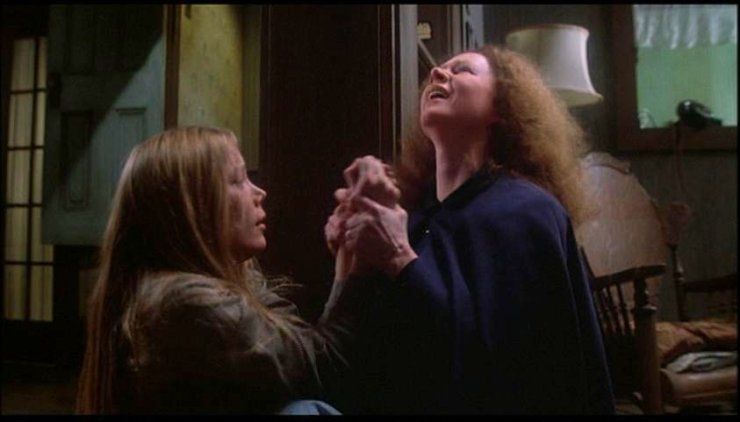
Thana is eventually killed by another woman; her female coworker, who doesn’t like sexism any more than Thana does, but who’s scared and trying to stop the shooting spree. It’s a regressive message — if feminism goes Too Far, then it will come down to the reasonable “good” women to stop the misandrist “bad” ones — but at least it accords “goodness” to some women. It allows that Thana’s anger is founded on a real problem, even as it also portrays Thana herself as out of control.
Carrie thinks there’s something rotten about the whole gender. Guys might get roped into women’s schemes, from time to time, but it’s always women yanking the ropes. Nor is Carrie simply “becoming a woman,” in that gym scene. She’s becoming a specific woman; her mother, the thundering judge on high, the punisher of wickedness. “Accepting at last her mother’s language of cleansing and purification, Carrie does not so much destroy the high school as subject it to ritual purgation by fire and water,” goes one of the many, many essays about Carrie in The Dread of Difference. The two women eventually die as one, holding each other; they become the same body after death, just as they were the same body before Carrie was born.
Carrie grows from a child to a woman, just as she grows from a victim to a monster, but the story argues these are essentially the same thing. Every step Carrie takes toward being a woman is a step she takes away from humanity. Her mother waits at the end of that road, warning the audience there is nothing more frightening in this world than a grown woman; nothing worse that Carrie, or anyone, could become.
Thana and Carrie both begin their movies as children, and end them as women. Feminine sexuality and presentation come with that package: Thana adopts red lipstick and midnight killing sprees at about the same time. The revelation that Carrie looks pretty in her prom dress comes shortly before the revelation that she can use a basketball hoop to cut you in half.
Womanhood is connected to violence; womanhood, in some senses, is violence. Carrie gets to be a woman for all of thirty seconds before she is doused in the blood, the terrible reminder of what Becoming A Woman means. From thence, we get to see everyone’s blood, as Carrie becomes, not a person, but a force of nature that tears the world apart in its wake.
I mean: I bleed, and I’m not a lady. I know plenty of ladies who don’t. But let’s entertain the metaphor that blood = adulthood for a moment. What it signifies, as far as I can figure, is that a woman can only be “likable” if we see her as a powerless victim; a child, in need of a child’s protection. The second she becomes an adult woman, she becomes scary, because that’s what adult women are to many men.
If you know, in your gut, that women have good reason to be angry at you, women’s anger can never be anything but threatening. We valorize women who are soft and childlike, women who are victimized and helpless, women who know their place, because, if those women were in a position to demand justice, we might not emerge unscathed.
So the heroines of rape-revenge movies always die; they pay for their power with victimhood, because it redeems and contains their rage. Killing those women neutralizes them and makes them lovable. It shows that their quest for justice was in vain, which means they were never really much of a threat, and in a patriarchy, “not much of a threat” is the most important thing for a woman to be.
Behind all these images of female badness and monstrosity and horror, both movies suggest, is a "good" woman, and it's hard to ignore that a "good" woman always looks like this:
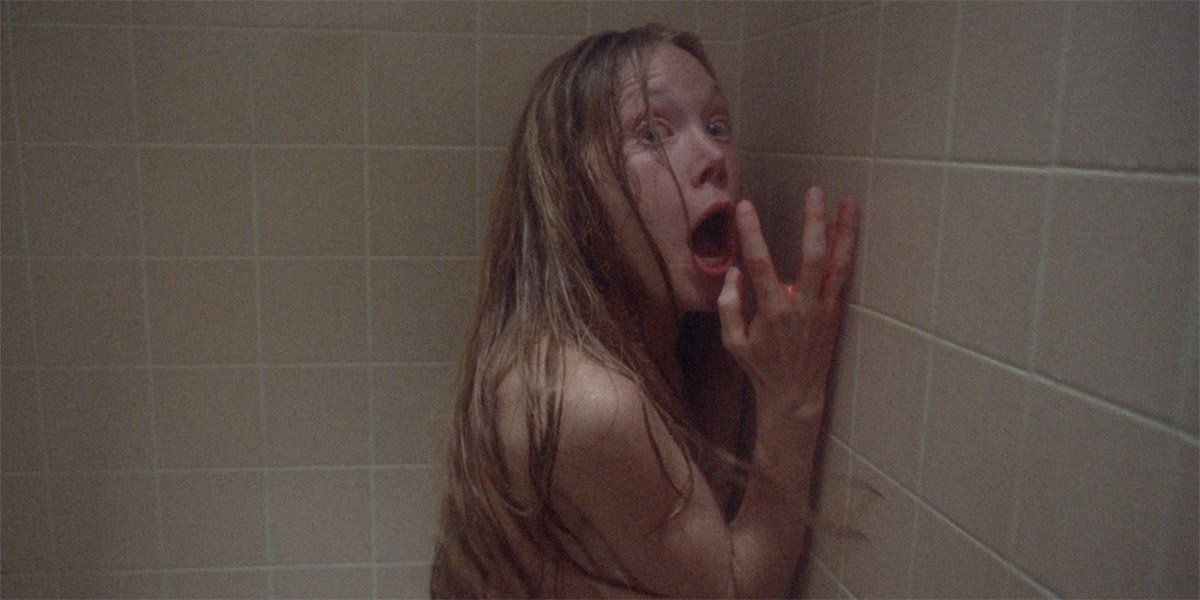
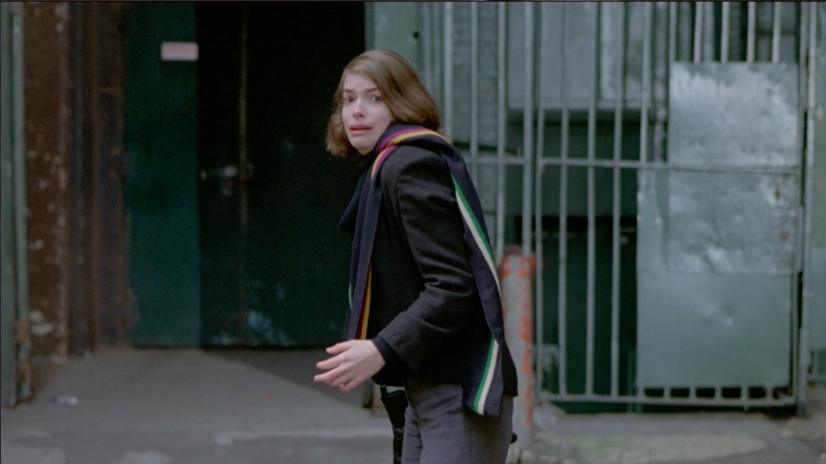
She looks frightened. She looks weak. She looks like a victim, because that's what we think a good, virtuous woman should be. Men's power, men's violence, is a way for women to prove how good they are – by putting up with it, or by dying. The world doesn't allow for a third option.
Yet these movies do. That's why I keep watching them, no matter how problematic they are. Whether by accident or design, rape-revenge movies create women who are not frightened, but frightening – women who assume the prerogative of inflicting violence and creating fear. It's not a peaceful solution, but no-one said it had to be. The way men treat women isn't terribly peaceful, either; we're just used to it by now. We shouldn't have gotten used to it; we don't have to be used to it; for the duration of these movies, we aren't used to it, and we can imagine a different way of doing things. Then the women die, their terrible power finally and irrevocably removed from the list of human possibilities, and we're back here again, in the world we know.
Ms. 45 is streaming on Tubi and Shudder. Carrie is available to rent on Amazon Prime and Google Play.
Over at my other job, I wrote about sitting out in cemeteries, my four-year-old's obsession with death, and how this has now become my own obsession with trying to figure out death and mortality. It's a laugh riot, check it out.
As for other recommendations: Everyone and their cousin has probably told you to read this one, but I spent last weekend on a cabin by the beach, finally finishing We Are Watching Eliza Bright by A.E. Osworth. It's just so extremely fucking smart about the mechanics of online misogyny and harassment, and you have got to get it out of your to-read pile and into your head if you can.